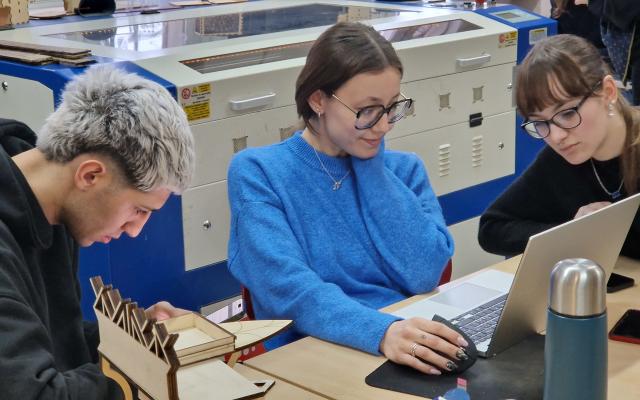In 10 years, Italy will be short of over 120,000 doctors and nurses and the health system will also require new professional figures. The Johnson & Johnson Foundation has launched Health4U to inform Italian high school students about how the field of health professions is changing.
Data Scientist, AI Engineer and Gamification Designer are just a few of the new figures that will soon be required by the health system. However, if action is not taken, the health system will also lack my basic roles: 22,000 MMGs, over 47,000 doctors for the National Health System and 53,000 nurses.
Today, the Johnson & Johnson Foundation launches Health4U, an educational and orientation programme for university and professional careers focusing on health, wellbeing and life science issues, promoted in collaboration with the Fondazione Mondo Digitale. The initiative, which will involve over 10,000 young men and women throughout Italy, addresses high school students and is meant to introduce them to the changes that are taking place in the health sector, from new professions to applications based on enabling technology. The programme, which includes the participation of experts from universities, hospitals and patient associations, includes 14 on-line modules organized as webinars.
In particular, the programme aims to introduce young men and women to health professions and a sector whose shortcomings have been deeply felt during the pandemic. If these shortcomings are not addressed, we may be short of more than 120,000 doctors and nurses in the next 10 years. Currently, over half of the doctors in Italy are aged 55. Naturally, this represents a problem for the future of the health system and the population. In fact, we will require over 22,000 general practitioners and 47,000 family doctors, not to mention that we are already over 53,000 nurses short, too. And this is a gap that will increase in the short-term.[1]
Moreover, the health emergency has revealed how we need to reorganise work in the health sector. Indeed, digitalization is a fundamental enabler in this sector and points to professional figures that will be key, such as Data Scientists, AI Engineers and Gamification Designers.
AI will play an increasingly important role. It allows health operators to save up to 48% of the time spent on routine and administrative tasks that take up to 70% of their time [2] and produce a bottleneck in assistance, service and operation performance.
Speaking at the presentation of Project Health4U, Alberto Mantovani, Scientific Director of the Istituto Clinico Humanitas and Professor emeritus at Humanitas University, emphasises how technology is changing health work: “The health professions represent a safety belt for the community as a whole. Medicine will increasingly turn to technology from different sectors, from artificial intelligence to engineering. The challenge will be to forge technology with the human dimension of medicine.”
“Faced with these challenges,” Massimo Scaccabarozzi, President of the Fondazione Johnson & Johnson Foundation commented, “we need to react quickly, reviewing the organisation and competences of health personnel for the future. On the other hand, this need is already clear at the ministerial level that has included a dedicated axis for digital training in the Next Generation EU Plan. It is essential not to waste these resources. They are key to promoting digital innovation, saving time and increasing efficiency. They will allow us to develop new professions and ways of working, expand the role of nurses, whose potential is largely underexploited and promote measures in favour of young men and women. We need to keep talent in Italy, stop professionals trained in Italian universities from fleeing abroad and increasing the attractiveness of university careers in the health sector. These are the growth and transformation drivers on which we must invest.”
Tonino Aceti, Spokesperson of the National Federation of Nursing Orders (FNOPI) and President of SalutEquità, emphasises the fundamental role of nurses: "Nursing is the profession of the present and of the future. It is constantly tuned to meet the needs of the community, to act and lend a helping hand to patients, supporting their rights and our National Health Service through understanding, human warmth, competence, integration and proximity. These qualities have become paramount during the pandemic and the state is investing to fund nursing and create innovative figures, such as family and community nurses. Nursing has been the only health profession degree that increased enrolment - by nearly 8% - in 2020, and the data reveals that one year before graduation (pre-Covid) 80% were already at work. The NHS lacks 53,000 nurses and this emergency must be quickly addressed. We need to exploit the clinical and technological competences of nurses, which are acquired through a rigorous university preparation that is constantly evolving with a view to specialization.”
The future of health must be based on young men and women, even by the generations that are now deciding on their professional future. This is the principle that has guided the Johnson & Johnson Foundation in promoting Health4U with the Fondazione Mondo Digitale.
“Speaking about public health competences has never been as fundamental as it has this year,” declares Mirta Michilli, Director General of the Fondazione Mondo Digitale. “We cannot let go of what we have learned from the health emergency. It must be transformed into a common resource at all levels: structural, organisational, economic, human and especially educational. Our collaboration with the Johnson & Johnson Foundation on Health4U provides us with the opportunity to introduce young men and women to how technology is profoundly changing the health professions. We are certain that academic careers should be based on knowledge and this is the objective of Health4U. We want to provide students with information on professional sectors that may be overlooked and put them in the condition of understanding the opportunity and making the right choices in terms of studies, research and the passion through which to improve the quality of our lives.”
The Johnson & Johnson Foundation was created in December 2000 by the Johnson & Johnson Group companies in Italy in the three sectors in which it operates: pharmaceutical (Janssen), consumer (Johnson & Johnson) and medical (Johnson & Johnson Medical). The foundation addresses all the fields interested by these companies: community health assistance, child health, health management education, mental health and innovation. The Johnson & Johnson Foundation was the first “grantmaking” enterprise developed in Italy. It funds projects addressing social issues, generally in partnership with non-profit organisations. Over its first 20 years of activity, the foundation has supported 348 projects, in collaboration with 218 associations and organisations, for a total funding of over 15 million euro.
[1] Source: Centro Studi Janssen on OECD Health data, 2020
[2] Source: EIT & McKinsey Report, Transforming Healthcare with AI, The Impact on the Workforce and Organisations, March 2020
Photos: Chokniti Khongchum from Pixabay



